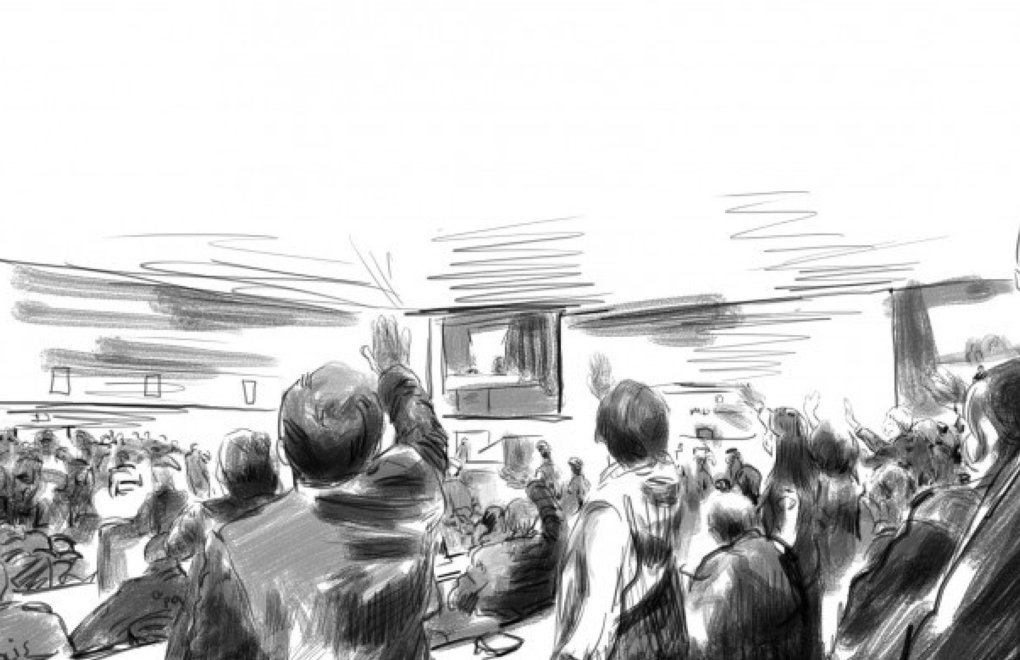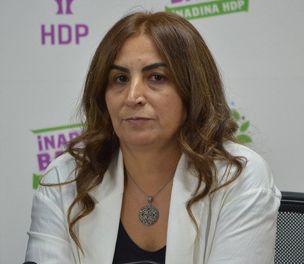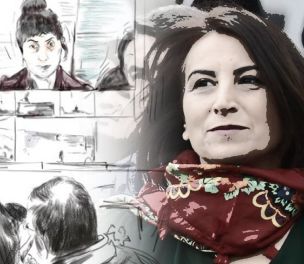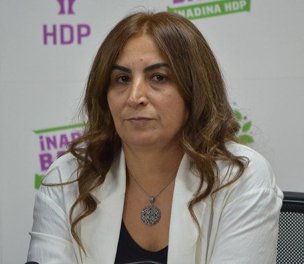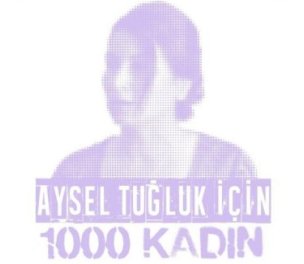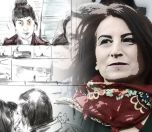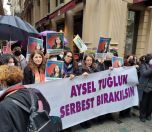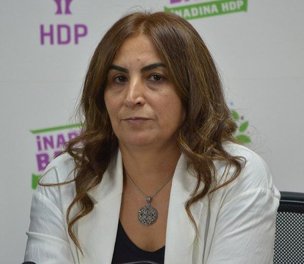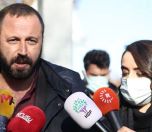* Image: Ercan Altuntaş
Click to read the article in Turkish / Kurdish
The first session of the 10th hearing of the Kobanî trial was held at the Ankara 22nd High Criminal Court today (February 28).
In the trial over the "October 6-8, 2014 Kobanî protests", there are 108 defendants, 21 arrested, including former HDP Co-Chairs Figen Yüksekdağ and Selahattin Demirtaş, Democratic Regions Party (DBP) former Co-Chair Sebahat Tuncel and HDP Central Executive Board members.
While the politicians arrested in Sincan Prison were present in the courtroom, the ones held in other prisons attended the hearing via video conference on the Audio and Visual Information System (SEGBİS).
As reported by Mezopotamya Agency (MA), the hearing began with an identity check and it was seen that the latest forensic medical report on ill prisoner Aysel Tuğluk has been added to the case file.
Taking the floor, Bülent Parmaksız, a former Central Executive Board member of the HDP, said that they have been facing mounting problems in prison and arbitrary searches have been on the increase.
'Copy-paste report' for Aysel Tuğluk
Attending the hearing via video conference, Aysel Tuğluk's lawyer Serdar Çelebi recalled that Tuğluk had been referred to the hospital in early 2021 and following a series of tests and examinations, she was diagnosed with dementia. He noted that while they requested the suspension of the execution and the release of Tuğluk, these requests remained inconclusive.
Acknowledging that the suspension of the execution is the case on certain conditions in Turkey and it shall be approved by the Forensic Medicine Institution, lawyer Serdar Çelebi reminded the court board of a European Court of Human Rights (ECtHR) ruling of rights violation, which concluded that this should not be a justification for release.
Arguing that the report of the Forensic Medicine Institution should not be sought, Çelebi said that they received alternative reports for this reason. Noting that the treatment of dementia in prison is not possible and Tuğluk cannot even make defense, Çelebi said that upon their requests, a written correspondence was sent to the Kocaeli Prison, where Tuğluk is held.
Recalling that Aysel Tuğluk was referred to the hospital upon this writ, lawyer Çelebi said, "In the report written at the hospital, it was said that she could partly answer the questions about current subjects and the diagnosis of dementia was confirmed; with the final decision left at the discretion of the Forensic Medicine Institution, she was referred to the Institution. We wanted to receive information from the Institution regarding her condition; however, the Institution wrote a report by copy-pasting from the indictment. How the report was prepared is quite obvious."
Serdar Çelebi underlined that the conclusion part of the forensic medical report does not answer the interim ruling, but it still refers to some tests, observations and findings. According to the lawyer, the report has found "weak instant verbal functions and abstraction skills" in Tuğluk. Based on this information, lawyer Çelebi asked the court board: "Do you insist on receiving a defense despite these findings? We said that we could not make defense. For this reason, we reiterate our request for release."
'Report not signed by a neurologist'
Speaking further about the latest forensic medical report, lawyer Serdar Çelebi raised concerns that even though dementia falls within the specialty of neurology, the report has not been signed by a single neurologist, adding that all signatures belong to psychiatrists.
Çelebi said that their requests for Tuğluk's release in respect for human dignity have been rejected. Noting that Tuğluk's disease is deteriorating, he stressed that her hospitalization is a must.
After Çelebi, Ayla Akat Ata took the floor to make her defense. Referring to the Dolmabahçe Agreement issued on February 28, 2015 during the Resolution Process for the Kurdish question, Akat Ata said that the Agreement put an emphasis on democratic politics in its first article and raised concerns that they cannot do democratic politics in Turkey now:
The problems that we face do not come up all across Turkey. My language is banned. Every plane that takes off from Diyarbakır causes panic. The reasons that we sense are not the same as the ones sensed in the west of the country. The door of the media is closed to us. They do not know what we go through. A seriously wrong narrative is pumped to the public. We want to be free citizens. I want to express myself as a Kurd within the borders of Turkey. How will the state express itself?
Handing down its interim ruling regarding the request of Gültan Kışanak to take the floor to speak as a witness about Aysel Tuğluk, the court has rejected the request. The hearing will continue tomorrow.
From the Kobanî indictmentThe Ankara Chief Public Prosecutor's Office prepared an indictment regarding the Kobanî protests that took place on October 6-8, 2014. 108 people, including the arrested former Co-Chair of the Peoples' Democratic Party (HDP) Selahattin Demirtaş, were among the "suspects". As reported by the state-run Anadolu Agency (AA), the indictment demanded the penalization of all suspects on charges of "disrupting the unity and territorial integrity of the state", "killing for 37 times, "attempted killing for 31 times", "burning the flag" and "violating the Law on Protecting Atatürk." Prepared by the Terror Crimes Investigation Bureau of the Ankara Chief Public Prosecutor's Office, the indictment was sent to the Ankara 22nd Heavy Penal Court. The court accepted the indictment on January 7, 2021. Here are the names of all defendants: Figen Yüksekdağ, Sebahat Tuncel, Selahattin Demirtaş, Selma Irmak, Sırrı Süreyya Önder, Gülfer Akkaya, Gülser Yıldırım, Gültan Kışanak, Ahmet Türk, Ali Ürküt, Alp Altınörs, Altan Tan, Ayhan Bilgen, Nazmi Gür, Ayla Akat Ata, Aysel Tuğluk, İbrahim Binici, Ayşe Yağcı, Nezir Çakan, Pervin Oduncu, Meryem Adıbelli, Mesut Bağcık, Bircan Yorulmaz, Bülent Barmaksız, Can Memiş, Cihan Erdal, Berfin Özgü Köse, Günay Kubilay, Dilek Yağlı, Emine Ayna, Emine Beyza Üstün, Mehmet Hatip Dicle, Ertuğrul Kürkçü, Yurdusev Özsökmenler, Arife Köse, Ayfer Kordu, Aynur Aşan, Ayşe Tonğuç, Azime Yılmaz, Bayram Yılmaz, Bergüzar Dumlu, Cemil Bayık, Ceylan Bağrıyanık, Cihan Ekin, Demir Çelik, Duran Kalkan, Elif Yıldırım, Emine Tekas, Emine Temel, Emrullah Cin, Engin Karaaslan, Enver Güngör, Ercan Arslan, Fatma Şenpınar, Fehman Hüseyin, Ferhat Aksu, Filis Arslan, Filiz Duman, Gönül Tepe, Gülseren Törün, Gülten Alataş, Gülüşan Eksen, Gülüzar Tural, Güzel İmecik, Hacire Ateş, Hatice Altınışık, Hülya Oran, İsmail Özden, İsmail Şengül, Kamuran Yüksek, Layika Gültekin, Leyla Söğüt Aydeniz, Mahmut Dora, Mazhar Öztürk, Mazlum Tekdağ, Abdulselam Demirkıran, Mehmet Taş, Mehmet Tören, Menafi Bayazit, Mızgın Arı, Murat Karayılan, Mustafa Karasu, Muzaffer Ayata, Nazlı Taşpınar, Neşe Baltaş, Nihal Ay, Nuriye Kesbir, Remzi Kartal, Rıza Altun, Ruken Karagöz, Sabiha Onar, Sabri Ok, Salih Akdoğan, Salih Müslüm Muhammed, Salman Kurtulan, Sara Aktaş, Sibel Akdeniz, Şenay Oruç, Ünal Ahmet Çelen, Yahya Figan, Yasemin Becerekli, Yusuf Koyuncu, Yüksel Baran, Zeki Çelik, Zeynep Karaman, Zeynep Ölbeci, Zübeyir Aydar. About Kobanî protestsBefore the protests held to support Kobanî in northern Syria in 2014, those who were waiting in the district of Suruç, Urfa in southeastern Turkey and wanted to cross the border were intervened with pepper gas and rubber bullets. In the meantime, some pictures allegedly showing ISIS militia crossing the border of Turkey were published. President and ruling AKP Chair Recep Tayyip Erdoğan made statements indicating that they equated PKK with ISIS. While the wounded coming from Kobanî were kept waiting on the border, the wounded from ISIS were treated at hospitals. Several news reports were reported in the press, saying "Kobanî fell." These news reports were denied every time. After the HDP made a call to take to the streets against a possible massacre in Kobanî, thousands of people protested in Kurdish-majority provinces as well as Ankara and İstanbul. While left parties also supported these protests, deaths also occurred with the onset of police violence. Street conflicts ensued. 42 people lost their lives from October 6 to 12, 2014. According to a report by the Human Rights Association (İHD), 46 people died, 682 people were wounded and 323 people were arrested in the protests held between September 7 and 12, 2014. As reported by the AA, 31 people lost their lives, 221 citizens and 139 police officers were wounded. |
(EMK/SD)




